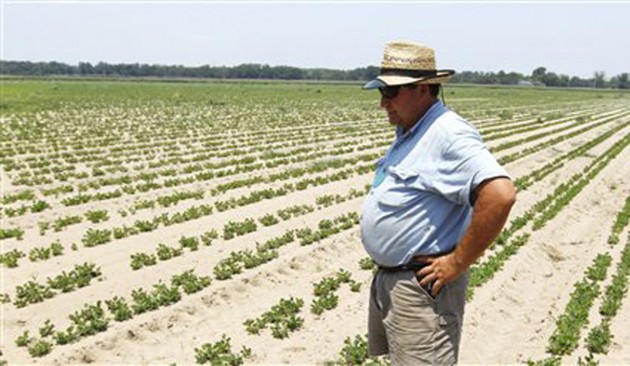
Associated Press
By Ray Henry and Sarah Skidmore
Associated Press
ATLANTA, Ga. — A hot, dry summer in key producing states and competition from more profitable crops have shrunk the U.S. peanut crop this year by an expected 13 percent. It would be smallest harvest recorded since 2006. The tight supply means consumers will soon pay more for another grocery staple.
Peanut butter producers have plans to hike prices for peanut butter significantly in the next few weeks. Those who package nuts for snacks say they are watching their competitors’ actions.
The J.M. Smucker Co., which makes Jif peanut butter, plans to raise its wholesale prices 30 percent in November. Kraft Foods Co., which launched its Planters peanut butter in June, is raising prices 40 percent on Oct. 31.
Unilever, which makes Skippy brand peanut butter, said the company is watching the commodities market very closely and will make pricing adjustments as needed.
“It’s been a tough season, it sure has,” said Rodney Dawson, a farmer in Hawkinsville, Ga.
Dawson found he could make more money growing corn and cotton than peanuts. As a result, he and other U.S. growers cut back on planting peanuts.
Peanut farmers had to delay planting this spring because of the heat, which cut production.
Georgia, the largest peanut-producing state in the country, saw record-breaking heat and a lack of rainfall that prevented some peanut seeds from germinating in the field.
Other plants that did grow were baked in the summer sun, producing poor-quality nuts or sometimes nothing at all.
“It was so dry you didn’t have any moisture in the soil to make the seed even rot,” he said. “It just laid there in the soil. I’ve never seen that before.”
According to USDA estimates this week, farmers who had runner peanuts — the most common kind and the type used for peanut butter — could sell their crop for nearly $1,200 a ton, up from nearly $450 a ton last year.
While it’s a hard season for farmers, it’s also tough on consumers too as they’ve seen an increase in the cost of groceries from coffee to cereal.
Peanut butter is considered a staple in many U.S. diets, as consumers eat about 6 pounds of peanut products a year, according to the American Peanut Council, an industry trade group.
“We probably won’t be happy about it but we will still buy it,” said Sarah Creem, a mother of two in Portland, Ore. “As picky as children are with food, you will buy what they eat.”
Some peanut manufacturers have told supermarkets they will pare back peanut-based product lines and could increase prices next month, said Tracy Pawelski, a spokeswoman for Ahold USA, the parent company of the Stop and Shop, Giant Martins and Giant Food of Maryland grocery stores.
The firm said it will work with its suppliers to mitigate price increases, but it expects supply problems will linger until next year’s harvest.
“Customers will continue to see increases in prices at the shelf,” Pawelski said.



